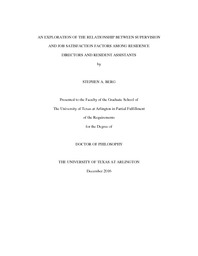
ATTENTION: The works hosted here are being migrated to a new repository that will consolidate resources, improve discoverability, and better show UTA's research impact on the global community. We will update authors as the migration progresses. Please see MavMatrix for more information.
Show simple item record
| dc.contributor.advisor | Brown, Casey Graham | |
| dc.creator | Berg, Stephen A. | |
| dc.date.accessioned | 2017-02-14T16:12:20Z | |
| dc.date.available | 2017-02-14T16:12:20Z | |
| dc.date.created | 2016-12 | |
| dc.date.issued | 2016-12-07 | |
| dc.date.submitted | December 2016 | |
| dc.identifier.uri | http://hdl.handle.net/10106/26406 | |
| dc.description.abstract | Supervising Resident Assistants (RAs) on college campuses is one of the most critical roles of housing staff members. The RA position is difficult based on the number of responsibilities the job requires; it is filled with multiple stressors, such as role ambiguity and role conflict. Supervision is a critical skill for student affairs professionals to possess yet there remains little research on the supervision of RAs. In this study, the relationship between perceived levels of synergistic supervision, training, and job satisfaction factors was examined among residence directors (RDs) and RAs.
The researcher sought to fill this gap the in the research by surveying both RAs and RDs in Texas and Oklahoma. Data were gathered by a survey incorporating the following scales: Synergistic Supervision Scale, Michigan Organizational Assessment Questionnaire’s Job Satisfaction and Intention to Turnover Scales, and Role Conflict and Ambiguity Scale. Correlation analyses revealed a strong to moderate negative relationship between perceived level of synergistic supervision received by RAs and role conflict, role ambiguity, and intention to turnover. Additionally, there was a moderate to strong positive relationship between RAs’ perceived level of synergistic supervision received and job satisfaction and amount of training received by RDs. There was no significant relationship found between job satisfaction levels or perceptions of synergistic supervision of RDs and RAs.
The findings have implications on the importance of supervision on the experience and retention of RAs. RAs who reported higher levels of synergistic supervision received were more likely to report lower intention to turnover, role conflict, and role ambiguity, and higher job satisfaction. Additionally, the findings suggest a continued lack of supervision training for entry-level professionals, which has an impact on the quality of the supervision delivered. Finally, the study furthers the research on the synergistic supervision model in student affairs by expanding the research to paraprofessional staff members. | |
| dc.format.mimetype | application/pdf | |
| dc.language.iso | en_US | |
| dc.subject | Supervision | |
| dc.subject | Attrition | |
| dc.subject | Role conflict | |
| dc.subject | Role ambiguity | |
| dc.subject | Job satisfaction | |
| dc.subject | Resident assistant | |
| dc.subject | Residence director | |
| dc.subject | Student housing | |
| dc.title | AN EXPLORATION OF THE RELATIONSHIP BETWEEN SUPERVISION AND JOB SATISFACTION FACTORS AMONG RESIDENCE DIRECTORS AND RESIDENT ASSISTANTS | |
| dc.type | Thesis | |
| dc.degree.department | Educational Leadership and Policy Studies | |
| dc.degree.name | Doctor of Philosophy in Educational Leadership and Policy Studies | |
| dc.date.updated | 2017-02-14T16:12:20Z | |
| thesis.degree.department | Educational Leadership and Policy Studies | |
| thesis.degree.grantor | The University of Texas at Arlington | |
| thesis.degree.level | Doctoral | |
| thesis.degree.name | Doctor of Philosophy in Educational Leadership and Policy Studies | |
| dc.type.material | text | |
| dc.creator.orcid | 0000-0002-8989-0796 | |
Files in this item
- Name:
- BERG-DISSERTATION-2016.pdf
- Size:
- 1020.Kb
- Format:
- PDF
This item appears in the following Collection(s)
Show simple item record


